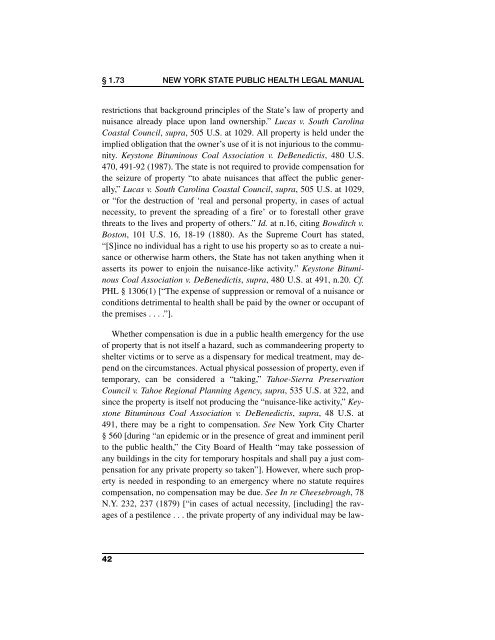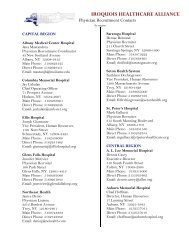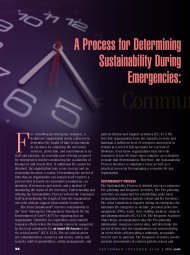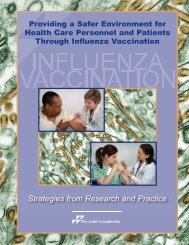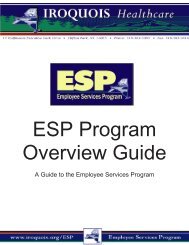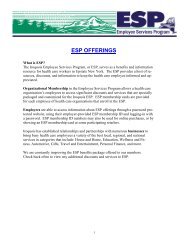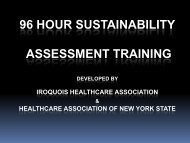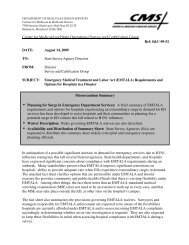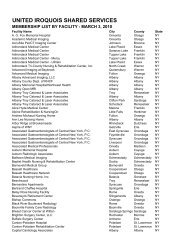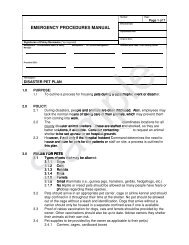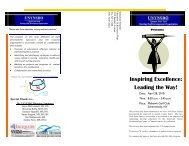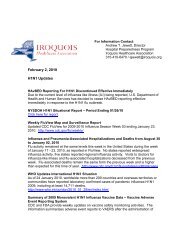NYS Public Health Legal Manual: A Guide for Judges, Attorneys ...
NYS Public Health Legal Manual: A Guide for Judges, Attorneys ...
NYS Public Health Legal Manual: A Guide for Judges, Attorneys ...
You also want an ePaper? Increase the reach of your titles
YUMPU automatically turns print PDFs into web optimized ePapers that Google loves.
§ 1.73 NEW YORK STATE PUBLIC HEALTH LEGAL MANUAL<br />
restrictions that background principles of the State’s law of property and<br />
nuisance already place upon land ownership.” Lucas v. South Carolina<br />
Coastal Council, supra, 505 U.S. at 1029. All property is held under the<br />
implied obligation that the owner’s use of it is not injurious to the community.<br />
Keystone Bituminous Coal Association v. DeBenedictis, 480 U.S.<br />
470, 491-92 (1987). The state is not required to provide compensation <strong>for</strong><br />
the seizure of property “to abate nuisances that affect the public generally,”<br />
Lucas v. South Carolina Coastal Council, supra, 505 U.S. at 1029,<br />
or “<strong>for</strong> the destruction of ‘real and personal property, in cases of actual<br />
necessity, to prevent the spreading of a fire’ or to <strong>for</strong>estall other grave<br />
threats to the lives and property of others.” Id. at n.16, citing Bowditch v.<br />
Boston, 101 U.S. 16, 18-19 (1880). As the Supreme Court has stated,<br />
“[S]ince no individual has a right to use his property so as to create a nuisance<br />
or otherwise harm others, the State has not taken anything when it<br />
asserts its power to enjoin the nuisance-like activity.” Keystone Bituminous<br />
Coal Association v. DeBenedictis, supra, 480 U.S. at 491, n.20. Cf.<br />
PHL § 1306(1) [“The expense of suppression or removal of a nuisance or<br />
conditions detrimental to health shall be paid by the owner or occupant of<br />
the premises . . . .”].<br />
Whether compensation is due in a public health emergency <strong>for</strong> the use<br />
of property that is not itself a hazard, such as commandeering property to<br />
shelter victims or to serve as a dispensary <strong>for</strong> medical treatment, may depend<br />
on the circumstances. Actual physical possession of property, even if<br />
temporary, can be considered a “taking,” Tahoe-Sierra Preservation<br />
Council v. Tahoe Regional Planning Agency, supra, 535 U.S. at 322, and<br />
since the property is itself not producing the “nuisance-like activity,” Keystone<br />
Bituminous Coal Association v. DeBenedictis, supra, 48 U.S. at<br />
491, there may be a right to compensation. See New York City Charter<br />
§ 560 [during “an epidemic or in the presence of great and imminent peril<br />
to the public health,” the City Board of <strong>Health</strong> “may take possession of<br />
any buildings in the city <strong>for</strong> temporary hospitals and shall pay a just compensation<br />
<strong>for</strong> any private property so taken”]. However, where such property<br />
is needed in responding to an emergency where no statute requires<br />
compensation, no compensation may be due. See In re Cheesebrough, 78<br />
N.Y. 232, 237 (1879) [“in cases of actual necessity, [including] the ravages<br />
of a pestilence . . . the private property of any individual may be law-<br />
42


